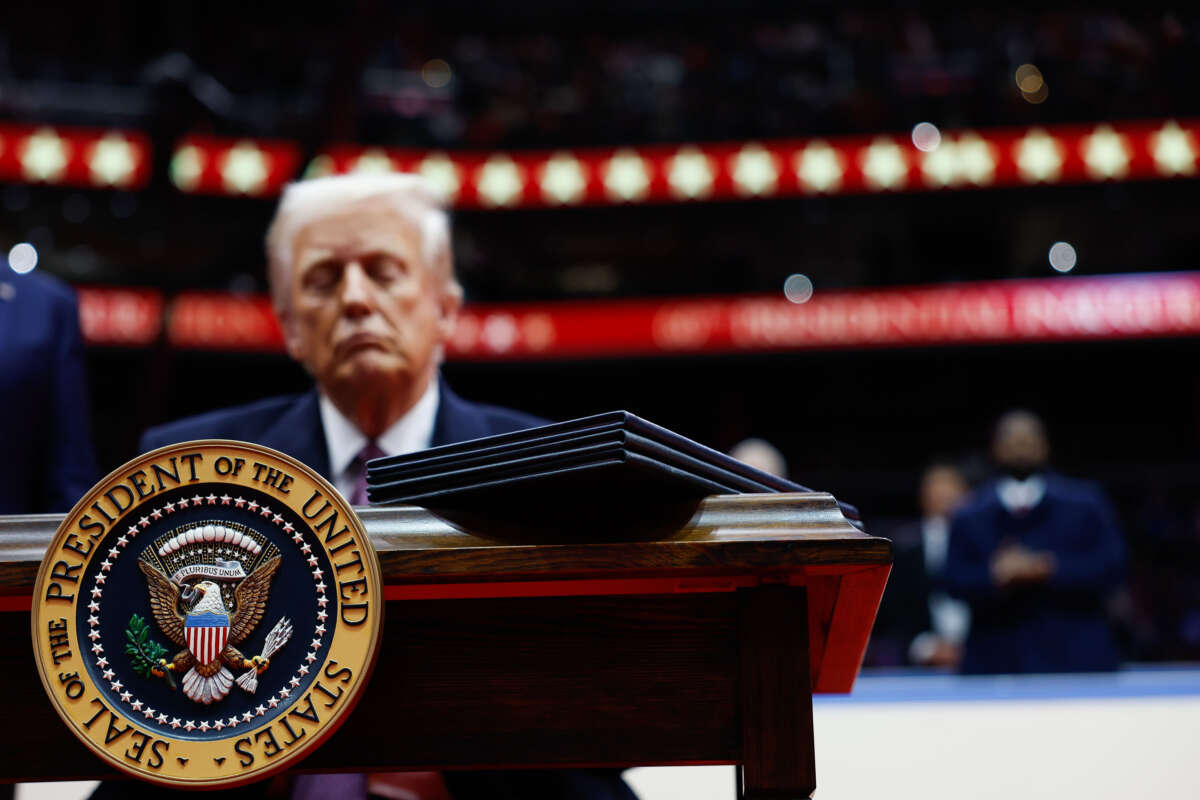The American Civil Liberties Union (ACLU), along with several other pro-immigrant groups, is suing the Trump administration after President Donald Trump signed an executive order that seeks to end the constitutionally recognized right of birthright citizenship.
The 14th Amendment of the U.S. Constitution states in its first sentence that:
All persons born or naturalized in the United States, and subject to the jurisdiction thereof, are citizens of the United States and of the state wherein they reside.
Yet on Monday, his first day back in the White House, Trump falsely asserted that he had the presidential right to unilaterally change the interpretation of the amendment.
Trump’s executive order wrongly stipulates that the 14th Amendment “has never been interpreted to extend citizenship universally to everyone born within the United States.” However, since 1898, the Supreme Court has indeed taken that view.
While signing the order, Trump grumbled that the U.S. has such a standard in place. “It’s ridiculous, we’re the only country in the world that does this with birthright, as you know, and it’s just absolutely ridiculous,” Trump told media.
That statement, too, is false: More than three dozen countries across the globe — including nearly every country in the Western Hemisphere — recognize a right to birthright citizenship.
The ACLU, along with its local branches in New Hampshire and Maine, filed its lawsuit in New Hampshire federal court jointly with other legal organizations, including the Asian Law Caucus, State Democracy Defenders Fund, and the Legal Defense Fund. The suit is filed on behalf of children who would lose their citizenship rights immediately if the executive order goes into effect.
Trump’s order would become enforceable 30 days from now. The lawsuit, which represents children and their families who are members of immigrant rights groups — including New Hampshire Indonesian Community Support, League of United Latin American Citizens (LULAC), and Make the Road New York — seeks to enjoin the order from being implemented while the case is ongoing.
“The framers of the Fourteenth Amendment specifically enshrined this principle in our Constitution’s text to ensure that no one — not even the President — could deny children born in America their rightful place as citizens,” the text of the complaint reads. “They did so with full knowledge and intent that this would protect the children of immigrants, including those facing discrimination and exclusion.”
“Denying citizenship to U.S.-born children is not only unconstitutional — it’s also a reckless and ruthless repudiation of American values,” ACLU executive director Anthony D. Romero said in a statement. “Birthright citizenship is part of what makes the United States the strong and dynamic nation that it is.”
“Birthright citizenship is a cornerstone of our democracy,” said Theo Oshiro, co-executive director of Make the Road New York. “Our members, who come from all over the world, have created vibrant communities, loving families, and built this country over generations. To deny their children the same basic rights as all other children born in the United States is an affront to basic values of fairness, equality, and inclusivity.”
In addition to the ACLU-based lawsuit, attorneys general from 18 states across the country, as well as the cities of San Francisco and Washington, D.C., filed a joint suit seeking to block the order. Their brief, filed in a Massachusetts federal court, described Trump’s order as “extraordinary and extreme.”
“Presidents are powerful, but [Trump] is not a king,” New Jersey Attorney General Matthew Platkin said in a statement. “He cannot rewrite the Constitution with a stroke of the pen.”
Critics blasted the Trump administration’s attempt to overturn a well-established constitutional right.
“The president does not have the power to contravene either a federal statute or a constitutional amendment or any part of the Constitution by executive order,” Marquette University professor Patrick Sobkowski said.
“Birthright citizenship is guaranteed by the 14th Amendment to the U.S. Constitution. The Executive Order is blatantly unconstitutional,” Rep. Ritchie Torres (D-New York) wrote on Bluesky.
“Just so we’re clear: trying to suspend birthright citizenship = trying to suspend the Constitution,” Voters of Tomorrow executive director Santiago Mayer wrote.
Imani Gandy, senior legal analyst at Rewire, warned that pointing out the absurdity of Trump’s actions wouldn’t be enough to block the action — it would require the judiciary to uphold the standard of birthright citizenship.
“I would caution people to stop relying on the Constitution as written to have any meaning other than what the people Trump put on the Supreme Court says it means,” Gandy said. “‘He can’t do that’ is not a useful response to the things he’s going to do. The correct response is ‘Will the Court uphold that?'”
Trump is silencing political dissent. We appeal for your support.
Progressive nonprofits are the latest target caught in Trump’s crosshairs. With the aim of eliminating political opposition, Trump and his sycophants are working to curb government funding, constrain private foundations, and even cut tax-exempt status from organizations he dislikes.
We’re concerned, because Truthout is not immune to such bad-faith attacks.
We can only resist Trump’s attacks by cultivating a strong base of support. The right-wing mediasphere is funded comfortably by billionaire owners and venture capitalist philanthropists. At Truthout, we have you.
Our fundraising campaign is over, but we fell a bit short and still need your help. Please take a meaningful action in the fight against authoritarianism: make a one-time or monthly donation to Truthout. If you have the means, please dig deep.
